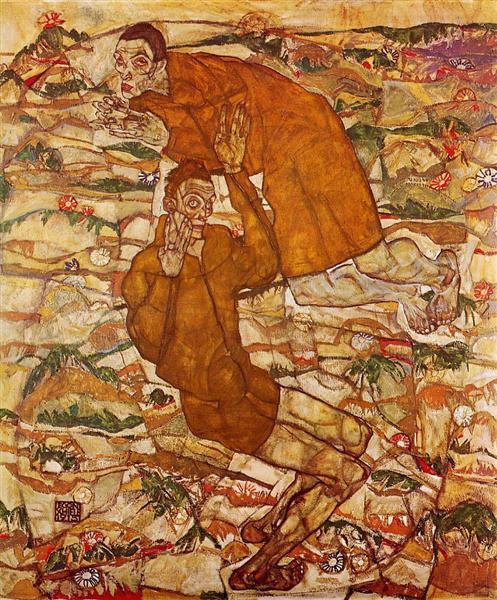Description
Egon Schiele's work "Levitation" (1915) is a hypnotic reflection of the artist's psychic and emotional concerns, characteristic of the period of uncertainty and transformation that lived in Europe just before World War I. Schiele, central figure of Austrian expressionism, shows through this painting his mastery in the representation of the human body and his relationship with the surrounding space. The work is presented in a vertical format, where a naked body seems to float on a background that evokes the notion of a void wrapped in nuances of gray and blue, tones that suggest both a disturbing serenity and an underlying restlessness.
The central character is in a position that combines rest and tension, suggesting the simultaneity of life and death, a recurring theme in Schiele's work. This ambiguity is accentuated by the way in which the subject's torso is disconnected from its base, a compositional strategy that emphasizes not only the idea of levitation, but also the notion of transcendence. Schiele's painting technique is distinctive; The lines that contour the body are almost aggressive, reflecting its unique style that challenges the conventionality of beauty. Through its brushstrokes, it achieves a visceral representation of the human body, imbued with raw emotions and an almost hypnotic attraction.
The use of color in "levitation" is subtle but powerful, with a palette that moves between the grays, blue and earth tones, which generates an atmosphere both captivating and disturbing. The fusion of the body with the background suggests a dialogue between being and its surroundings, where levitation could be interpreted metaphorically as the search for relief of earthly bonds, a desire for spiritual freedom. This emotional complexity is inscribed in a broader context of Schiele's work, who, inflected by his own life full of tumult, explored existential anguish, sexuality and alienation.
As part of the expressionist movement, "Levitation" shares affinities with other contemporary works of Schiele and its contemporaries, who also explored the human body as a means to express deep human experiences. The exposure of vulnerability and fragility of the human being becomes a visual code that invites reflection. Through the deformation and exaggeration of forms, Schiele, along with other artists of his time, emphasized the idea that the true essence of humanity lies in its imperfections.
It is essential to remember that Schiele's work is not only limited to his technique and style; It is also impregnated with a reflection on the identity and alienation of the individual in the context of modernity. "Levitation", in its essence, represents more than a simple visual act; It is a symbol of the internal struggle between the physical and the spiritual, the earthly and the ethereal, a confrontation that resonates deeply in the contemporary psyche, remaining relevant even today through the introspection it causes in the spectator. The work remains a testimony of Schiele's genius to capture the complexity of human existence, reminding us of the fragility of our connection with the world and among ourselves.
KUADROS ©, a famous paint on your wall.
Hand-made oil painting reproductions, with the quality of professional artists and the distinctive seal of KUADROS ©.
Art reproduction service with satisfaction guarantee. If you are not completely satisfied with the replica of your painting, we refund your money 100%.

